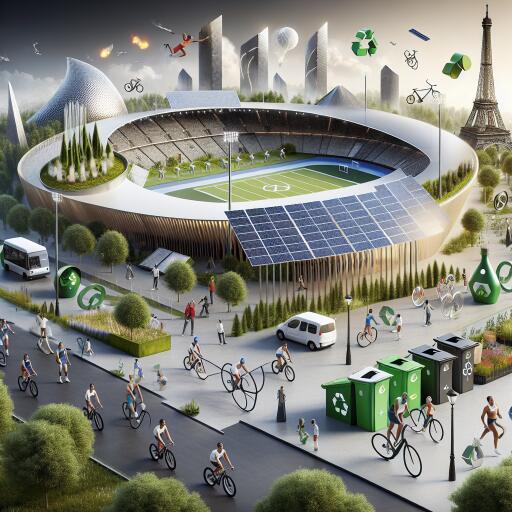
Paris 2024 Aims to Pave the Way for Eco-Friendly Olympics
In an ambitious pledge toward sustainability, the Paris 2024 Olympics are setting new standards for environmental consciousness in global sporting events. Central to Paris’ initiative to diminish its carbon footprint is the strategic decision to utilize existing infrastructure, augmented only by a minimal number of new constructions.
The crux of this eco-friendly strategy involves capitalizing on 95 percent of pre-existing or temporary venues for the games, thereby significantly reducing the need for new construction. Major new projects are limited to an aquatics center, a venue in Paris earmarked for badminton and gymnastics, and an athletes’ village in Seine-Saint-Denis, a suburb undergoing revitalization.
The construction of the athletes’ village reflects a stern commitment to lower emissions, with contractors mandated to achieve a 30 percent reduction in emissions compared to standard constructions. This directive spurred innovative approaches, including the use of low-carbon concrete and timber.
Additionally, efforts to mitigate the environmental impact extend to operational aspects of the games. One notable change is the integration of all sports venues into the city’s electricity grid, eliminating the dependency on diesel generators that were significantly utilized in previous Olympics, such as London, where approximately four million liters of diesel were consumed for generating electricity.
In collaboration with Coca-Cola, one of the Olympics’ premier sponsors, Paris 2024 will introduce 700 new drink fountains across venues, drastically reducing the reliance on plastic bottles by serving approximately 50 percent of soft drinks without them. Moreover, the culinary offerings at the games will see a significant shift towards sustainability, with 60 percent of the menu composed of vegetarian options. Supplier contracts now invariably contain clauses emphasizing recycling and reuse.
To further echo its commitment to sustainability, all energy supplied to the games by EDF, the national energy group, will be sourced from renewable means.
However, the approach to “carbon offsetting” to compensate for the unavoidable emissions has been met with scrutiny. Despite aiming for an initial target of being “carbon positive” by investing in projects that absorb more carbon dioxide than the games emit, the ambition has been scaled back to achieving “carbon neutrality.” Moreover, a planned tender for a domestic offsetting project was shelved due to budget constraints. Critics of carbon offsetting highlight concerns over the environmental efficacy of many such projects and the lack of independent oversight that leaves the door open for skepticism.
In defense, Games organizers point to stringent selection criteria for offsetting projects, with a forestry initiative in France receiving state certification and international projects undergoing exhaustive audits. Details on these projects are anticipated to be disclosed to the public imminently.
Olympic Games have historically attracted environmental protests, reflecting a broader debate on the ecological impact of such large-scale events. While some advocate for a complete overhaul of the Olympics to mitigate its environmental footprint, including proposals for a more condensed format or a permanent location to minimize travel, others see an opportunity for the games to exemplify sustainability in practice.
Amidst the critique, there’s a shared understanding of the unique position sports and the Olympics hold in fostering unity and conveying a message of peace. As Paris 2024 approaches, the organizing committee underscores the broader ambition: comprehending the ecological impact of such phenomena and tirelessly working towards reducing it, thereby setting a precedent for future global sporting events to aspire towards.





Leave a Reply